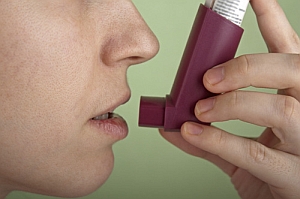Acton Pharmaceuticals Inc. in Marlborough, Massachusetts reports the U.S. Food and Drug Administration approved its drug Aerospan, an orally inhaled corticosteroid for the prevention of asthma attacks. The FDA approval, says Acton, came in response to a supplemental new drug application, and will enable the company to launch the drug in the U.S. during the first quarter of 2013.
The Centers for Disease Control and Prevention (CDC) say in 2010, 18.7 million or 1 in 12 adult Americans had asthma. Some 7 million, or 1 in 11, children also had asthma that year. In 2009, says CDC, 3,388 people died from asthma.
Aerospan, a hydrofluoroalkane-propelled drug originally named flunisolide, is administered in dosages of 80 micrograms. The drug is inhaled using a built-in spacer device, which assists in the delivery of the medicine to the lungs. A spacer is a hollow chamber that fits on the mouthpiece of a metered dose inhaler and captures the drug, which is then inhaled through breathing tubes into the lungs.
The drug is prescribed for prevention of attacks and ongoing maintenance of asthma, and recommended for patients who need more than a rescue inhaler. Maintenance inhalers can help prevent the wheezing coughing, and tightening of the airways, which causes shortness of breath and can be life threatening.
The company says Aerospan decreases inflammation by acting directly on the airways when inhaled into the lungs. The drug also decreases airway hyperresponsiveness, which makes airways less likely to strongly respond to an asthma trigger.
Acton says the drug can be used by adults and children as young as 6 years. Aerospan was tested in clinical trials with more than 1,700 patients, in cohorts of adults and children. In the trials, Acton reports Aerospan was generally well tolerated, with the most common adverse reactions — reported in less than 3 percent of patients — were headache, fever, allergic reaction, bacterial infection, pain and back pain, vomiting, dyspepsia, pharyngitis, rhinitis, cough, sinusitis, epistaxis, rash, and urinary tract infection.
The company notes treatment with orally inhaled corticosteroids may lead to signs or symptoms of hypercorticism, suppression of hypothalamic-pituitary-adrenal function, or suppression of growth in children. Glaucoma, increased intraocular pressure, and cataracts have been reported following the administration of inhaled corticosteroids.
Acton acquired the rights to Aerospan in 2009 under a licensing agreement with Forest Laboratories Inc. in that deal, Acton assumed all responsibilities for the development and commercialization of Aerospan.
Read more:
- Smartphone App Helps Monitor Lung
- 4D Lung Imaging Technology Developed
- Analytics Company, Johns Hopkins to Study Asthma Genomes
- Clinical Trial Approved of Potential Treatment for Asthma, COPD
* * *


 RSS - Posts
RSS - Posts
You must be logged in to post a comment.